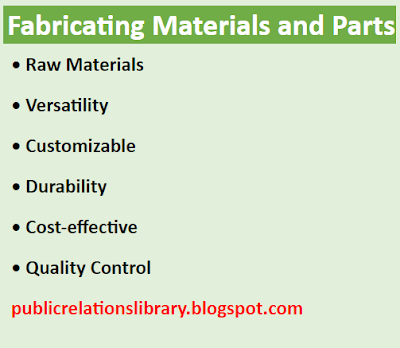Fabricating materials and parts are a crucial component of
manufacturing processes and play a key role in the production of finished
goods. They are used to create, assemble, and manufacture products of various
shapes, sizes, and designs. The following are the features and characteristics
of fabricating materials and parts.

- Raw
Materials: Fabricating materials and parts are made from a variety of raw
materials, including metals, plastics, composites, and ceramics. The type
of raw material used will depend on the intended use of the finished
product and the desired properties of the materials.
- Versatility:
Fabricating materials and parts are versatile and can be used in a wide
range of manufacturing processes, including casting, forging, stamping,
and machining. They can be shaped, molded, and formed into various forms
to meet the specific needs of a given project.
- Customizable:
Fabricating materials and parts can be customized to meet the specific
needs of a particular project or application. This includes customizing
the shape, size, and design of the parts to ensure that they meet the
requirements of the intended use.
- Durability:
Fabricating materials and parts are known for their durability and
resistance to wear and tear. They are able to withstand harsh conditions
and can last for a long time without degradation or wear.
- Cost-effective:
Fabricating materials and parts are cost-effective, as they can be
manufactured in large quantities, which reduces the cost per unit.
Additionally, they are reusable and can be recycled, which helps to reduce
waste and minimize costs.
- Quality
Control: Fabricating materials and parts undergo strict quality control
measures during the manufacturing process to ensure that they meet the
required specifications and standards. This helps to ensure that the
finished product is of high quality and meets the needs of the intended
use.
In conclusion, fabricating materials and parts are a
critical component of many manufacturing processes and play a vital role in the
production of finished goods. They offer versatility, customization,
durability, cost-effectiveness, and quality control, making them a preferred
choice for many manufacturers.